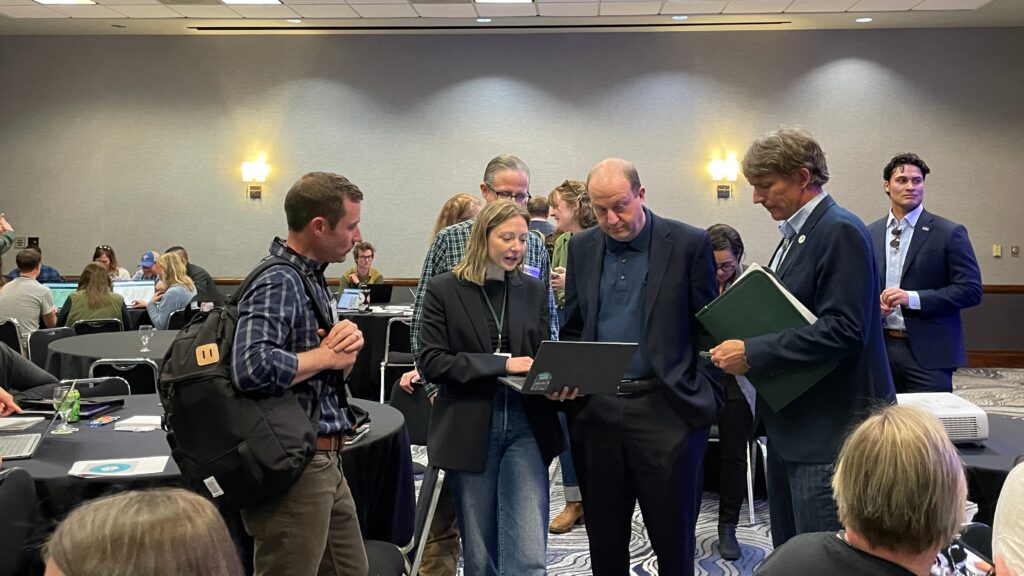On April 23, Colorado officially launched a bold new vision for the future of our lands, waters, wildlife, and outdoor experiences — Colorado’s Outdoors Strategy.
This statewide framework is a call to action for conservation, outdoor recreation, and climate resilience. It reflects a deep truth Coloradans know well: our outdoors are essential. They are where we connect — to the land, to one another, and to what makes this state home.
Why This Matters Now
Colorado’s outdoors face increasing pressures. In 2022 alone, 90 million people visited the state. Meanwhile, our population is expected to grow from 5.5 million to 8.5 million by 2050. Add in the growing risks of wildfires, drought, and climate change — and it’s clear that our natural resources and outdoor experiences need coordinated, forward-thinking care.
That’s where Colorado’s Outdoors Strategy comes in.
The strategy provides a unifying framework to guide strategic action on the landscape. It helps partners align around shared goals and tools — not just to manage challenges, but to build something lasting and better for future generations.
A Strategy Built on Collaboration
The strategy is built around three core goals:
- Climate-Resilient Conservation and Restoration
- Exceptional and Sustainable Outdoor Recreation
- Coordinated Planning and Funding
The development of the strategy was driven by input from across the state — including public agencies, nonprofits, landowners, Tribal Nations, outdoor recreation groups, and community voices. A key partner in this work was Keystone Policy Center, whose expertise in collaboration helped guide the strategy’s development.
“The Colorado Outdoors Strategy is a unique, collaborative approach that will inspire and shape the future of Colorado’s outdoors. It can also serve as a model for other states. It shows how we can plan from the local level up to the statewide scale to manage, protect, and enjoy our outdoor spaces,” said Julie Shapiro, Director of Keystone’s Center for Natural Resources. “There’s a tremendous amount of common ground when it comes to these issues, and Colorado has shown that it’s possible to bring together diverse interests to build a shared vision for the future of our outdoors.”
A Tool for Everyone

Whether you’re a public land manager, a recreation planner, a conservation group, a local official, or someone who just loves the outdoors — Colorado’s Outdoors Strategy is designed to support your work.
With tools like an interactive data dashboard, plan library, and a resource hub hosted by Colorado Parks and Wildlife (CPW), the strategy gives users access to powerful data and guidance for planning and collaboration.
Local Partnerships, Statewide Impact
A cornerstone of the strategy is the Regional Partnerships Initiative — a growing network of 21 locally driven coalitions covering nearly 80% of the state. Since its launch in 2021, CPW and Great Outdoors Colorado (GOCO) have invested $6.07 million to strengthen the capacity and development of these member coalitions, advancing conservation, outdoor recreation, and climate resilience efforts statewide. These investments and partnerships are vital to ensuring that local priorities shape statewide action, and that solutions are tailored to each region’s needs. Regional Partnerships bring voices together and help communities take action on what matters most.
Learn More
Colorado’s Outdoors Strategy is now live and ready to explore. Visit https://cpw.state.co.us/coloradosoutdoorsstrategy to access the full strategy and tools for implementation.


 Effective March 1, 2025, Thomas J. Vilsack, former United States Secretary of Agriculture and Governor of Iowa, became the first Chief Executive Officer for the World Food Prize Foundation. In this new role, Governor Vilsack is focusing on expanding the Foundation’s global network, and will further position the Foundation as a leader in addressing global food and nutrition insecurity, continuing his lifetime of public service.
Effective March 1, 2025, Thomas J. Vilsack, former United States Secretary of Agriculture and Governor of Iowa, became the first Chief Executive Officer for the World Food Prize Foundation. In this new role, Governor Vilsack is focusing on expanding the Foundation’s global network, and will further position the Foundation as a leader in addressing global food and nutrition insecurity, continuing his lifetime of public service. Shelby Coffey III is a distinguished journalist, media executive, and thought leader whose career has helped shape the landscape of American news and public discourse. Over several decades, Coffey has held some of the most influential roles in journalism, including serving as editor of the Los Angeles Times, executive vice president of ABC News, and deputy managing editor of The Washington Post. His editorial leadership extended to key roles as president of CNN Financial News, editor of the Dallas Times Herald, and U.S. News & World Report.
Shelby Coffey III is a distinguished journalist, media executive, and thought leader whose career has helped shape the landscape of American news and public discourse. Over several decades, Coffey has held some of the most influential roles in journalism, including serving as editor of the Los Angeles Times, executive vice president of ABC News, and deputy managing editor of The Washington Post. His editorial leadership extended to key roles as president of CNN Financial News, editor of the Dallas Times Herald, and U.S. News & World Report. Jerry Steiner has spent 40 years involved in agriculture following growing up on a Wisconsin dairy farm. He began his career with Monsanto, in multiple business leadership roles. From 2003-2013 he served as a member of the Executive team, as the company’s Executive Vice President of Sustainability and Corporate Affairs. He led the company’s global Government, Public and Industry Affairs teams across the 70 countries where Monsanto conducts business. This experience got Jerry connected to the Keystones centers work in agriculture. Key among his responsibilities were shaping the company’s public policy and building partnerships aimed at helping farmers around the world produce more food, while conserving valuable resources like water and energy. Two unique partnership that developed under his leadership were drought tolerant corn with 5 African countries, CIMMYT and the Gates foundation, and a building a sustainable business model in Brazil with the value chain leading to significant multi-company investment and soybean varieties that can protected themselves.
Jerry Steiner has spent 40 years involved in agriculture following growing up on a Wisconsin dairy farm. He began his career with Monsanto, in multiple business leadership roles. From 2003-2013 he served as a member of the Executive team, as the company’s Executive Vice President of Sustainability and Corporate Affairs. He led the company’s global Government, Public and Industry Affairs teams across the 70 countries where Monsanto conducts business. This experience got Jerry connected to the Keystones centers work in agriculture. Key among his responsibilities were shaping the company’s public policy and building partnerships aimed at helping farmers around the world produce more food, while conserving valuable resources like water and energy. Two unique partnership that developed under his leadership were drought tolerant corn with 5 African countries, CIMMYT and the Gates foundation, and a building a sustainable business model in Brazil with the value chain leading to significant multi-company investment and soybean varieties that can protected themselves. Jennifer Morris is the Chief Executive Officer of The Nature Conservancy, leading a team of nearly 6,000 staff working in more than 80 countries and territories tackling the dual crises of the
Jennifer Morris is the Chief Executive Officer of The Nature Conservancy, leading a team of nearly 6,000 staff working in more than 80 countries and territories tackling the dual crises of the  Congressman Joe Neguse represents Colorado’s 2nd District in the U.S. House of Representatives. He was elected to his first term in November 2018, becoming the first Black Member of Congress in Colorado history. In December 2022, Rep. Neguse was elected by his colleagues to serve as Chair of the Democratic Policy and Communications Committee (DPCC), becoming the first Coloradan to serve in a senior elected leadership role in the House in over 85 years. He serves on the Natural Resources and Judiciary Committees, and was also appointed by House Minority Leader Hakeem Jeffries to serve as one of four Democrats on the prestigious Rules Committee. Rep. Neguse serves as Ranking Member on the House Subcommittee on Federal Lands, which he previously Chaired in the 117th Congress.
Congressman Joe Neguse represents Colorado’s 2nd District in the U.S. House of Representatives. He was elected to his first term in November 2018, becoming the first Black Member of Congress in Colorado history. In December 2022, Rep. Neguse was elected by his colleagues to serve as Chair of the Democratic Policy and Communications Committee (DPCC), becoming the first Coloradan to serve in a senior elected leadership role in the House in over 85 years. He serves on the Natural Resources and Judiciary Committees, and was also appointed by House Minority Leader Hakeem Jeffries to serve as one of four Democrats on the prestigious Rules Committee. Rep. Neguse serves as Ranking Member on the House Subcommittee on Federal Lands, which he previously Chaired in the 117th Congress. Llewellyn King was born in Southern Rhodesia, now Zimbabwe. He went into journalism as soon as he turned 16, stringing for Time magazine and United Press in Africa.
Llewellyn King was born in Southern Rhodesia, now Zimbabwe. He went into journalism as soon as he turned 16, stringing for Time magazine and United Press in Africa. Steven Williams is the Chief Executive Officer of PepsiCo North America, overseeing a more than $48 billion business that spans PepsiCo’s Foods and Beverage operating units. His leadership encompasses more than 125,000 associates and over 900 locations across the U.S. and Canada. Steven joined PepsiCo in 2001 as part of PepsiCo’s acquisition of the Quaker Oats Company, which he joined in 1997, and has held leadership positions of increased responsibility since.
Steven Williams is the Chief Executive Officer of PepsiCo North America, overseeing a more than $48 billion business that spans PepsiCo’s Foods and Beverage operating units. His leadership encompasses more than 125,000 associates and over 900 locations across the U.S. and Canada. Steven joined PepsiCo in 2001 as part of PepsiCo’s acquisition of the Quaker Oats Company, which he joined in 1997, and has held leadership positions of increased responsibility since.